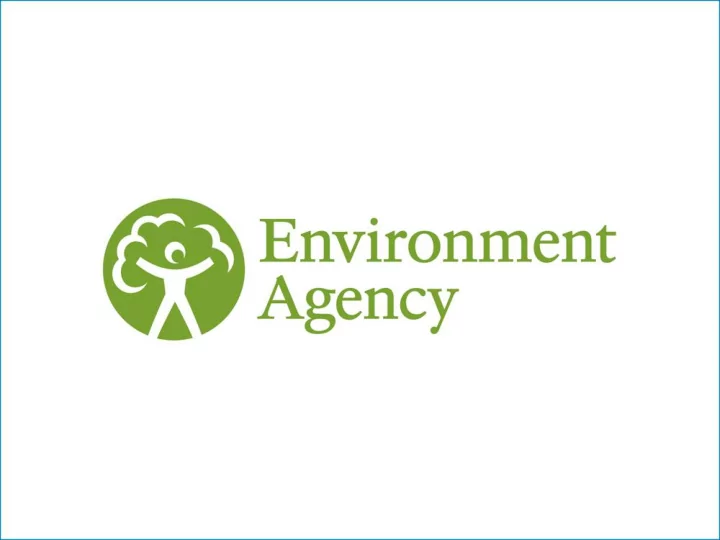

Introducing the Catchment Based Approach Name: James Duke. Job title: Catchment Coordinator: East Yorkshire. Date 10 th September 2014
Topics Water Framework Directive history Evidence and classification Cost beneficial v affordable The catchment based approach Wider partnership work The Water Framework Directive consultation Summary Questions
Topics Water Framework Directive history Evidence and classification Cost beneficial v affordable The catchment based approach Wider partnership work The Water Framework Directive consultation Summary Questions
Water Framework Directive History Introduced in 2000 and implemented in UK in 2003 Focussed on holistic catchment planning Key Principles Standardisation of water quality classification ‘One out, all out’ principle
The Humber River Basin District
Hull and East Riding Management Catchment
Louth, Grimsby and Ancholme Management Catchment
Humber Estuary Operational Catchments
Topics Water Framework Directive history Evidence and classification Cost beneficial v affordable The catchment based approach Wider partnership work The Water Framework Directive consultation Summary Questions
‘One out all out’ principle Element Classification Bad h Fish Poor Moderate Good Dissolved Oxygen Ammonia, High Invertebrates Poor Fish Failing Element =
Humber Estuary Measures We have taken a stakeholder- centred approach to identifying measures to be included in the River Basin Management Plan. Workshops held to help us identify reasons for failure, the evidence to support this, and measures which will address the failures. An area we identified where improvements can be made is the hydro- morphology of the water bodies. We are currently undertaking work to include WFD measures in the Flood Risk Management Strategy.
Topics Water Framework Directive history Evidence and classification Cost beneficial v affordable The catchment based approach Wider partnership work The Water Framework Directive consultation Summary Questions
Cost Beneficial v Affordable Cost beneficial – greatest environmental improvement per £1.00 How do you monetise environmental improvement Subjective Protected Areas and No Deterioration Affordable - do you have the money to complete the project?
Topics Water Framework Directive history Evidence and classification Cost beneficial v affordable The catchment based approach Wider partnership work The Water Framework Directive consultation Summary Questions
Catchment Based Approach Improving water at a local level To encourage collaborative working and a greater commitment to action Catchment coordinators Catchment partnership hosts
Catchment Coordinator Work with internal partners to ensure that every aspect of the environment agency’s work is structured around helping to ensure the agency meets it targets for Water Frame Directive. Work strategically with external partners, to achieve WFD and non-WFD outcomes.
Catchment Partnership Hosts To work strategically with the Environment Agency to seek innovative ways to realise Water Framework Directive outcomes To work collaboratively with local partners and established interest groups to deliver environmental outcomes
Topics Water Framework Directive history Evidence and classification Cost beneficial v affordable The catchment based approach Wider partnership work The Water Framework Directive consultation Summary Questions
Including WFD Measures in the Humber Flood Risk Management Strategy The Strategy is currently in the process of being updated with the aim of delivering it as a partnership document. Work is ongoing to identify improvements to the water environment that can be delivered through flood defence schemes. Stakeholder engagement has been key to identifying where improvements might be delivered. Many measures are simple and cheap to include in scheme design.
WFD and the Green Infrastructure Study The Environment Agency is in the process of delivering a project to identify how WFD measures can be delivered through FCRM activity. These measures largely focus on improvements to the local water environment around the riparian zone. We are also looking at producing more WFD guidance and information for our partners and the public. The project has now been extended to consider how we might deliver other social, economic and environmental objectives through the design of flood risk management schemes.
Frontage at Melton
Topics Water Framework Directive history Evidence and classification Cost beneficial v affordable The catchment based approach Wider partnership work The Water Framework Directive consultation Summary Questions
Water Framework Directive Consultation Q1: Do you agree with the proposed changes to the river basin district and catchment, water body boundaries and artificial and heavily modified water body designations? Q2 Do you agree with the objectives proposed for water bodies and protected areas? Q3 Where flexibility exists, should the priority be maximising the number of water bodies at good status or improving the worst water bodies? Q4 Do you agree the correct measures have been identified? Q5 Do you agree with the way the economic process has been done? Q6 What measures can you deliver to help achieve the long term objectives? Q7: Do you have any further comments on this consultation
Topics Water Framework Directive history Evidence and classification Cost beneficial v affordable The catchment based approach Wider partnership work The Water Framework Directive consultation Summary Questions
Summary Holistic approach to water management Tighter requirements for water quality Failures and measures on the estuary Environmental improvements through collaborative working Wider Estuary projects The consultation process
Topics Water Framework Directive history Evidence and classification Cost beneficial v affordable The catchment based approach Wider partnership work The Water Framework Directive consultation Summary Questions
Thanks......... Further Reading River Basin Management Plans https://www.gov.uk/government/collections/river-basin-management-plans The Catchment Based Approach www. catchment basedapproach.org/about Environment Agency, Crosskill House, Mill Lane, Beverley, HU17 9JB. Tel: 01709 312951. Email: james.duke@environment-agency.gov.uk
Recommend
More recommend